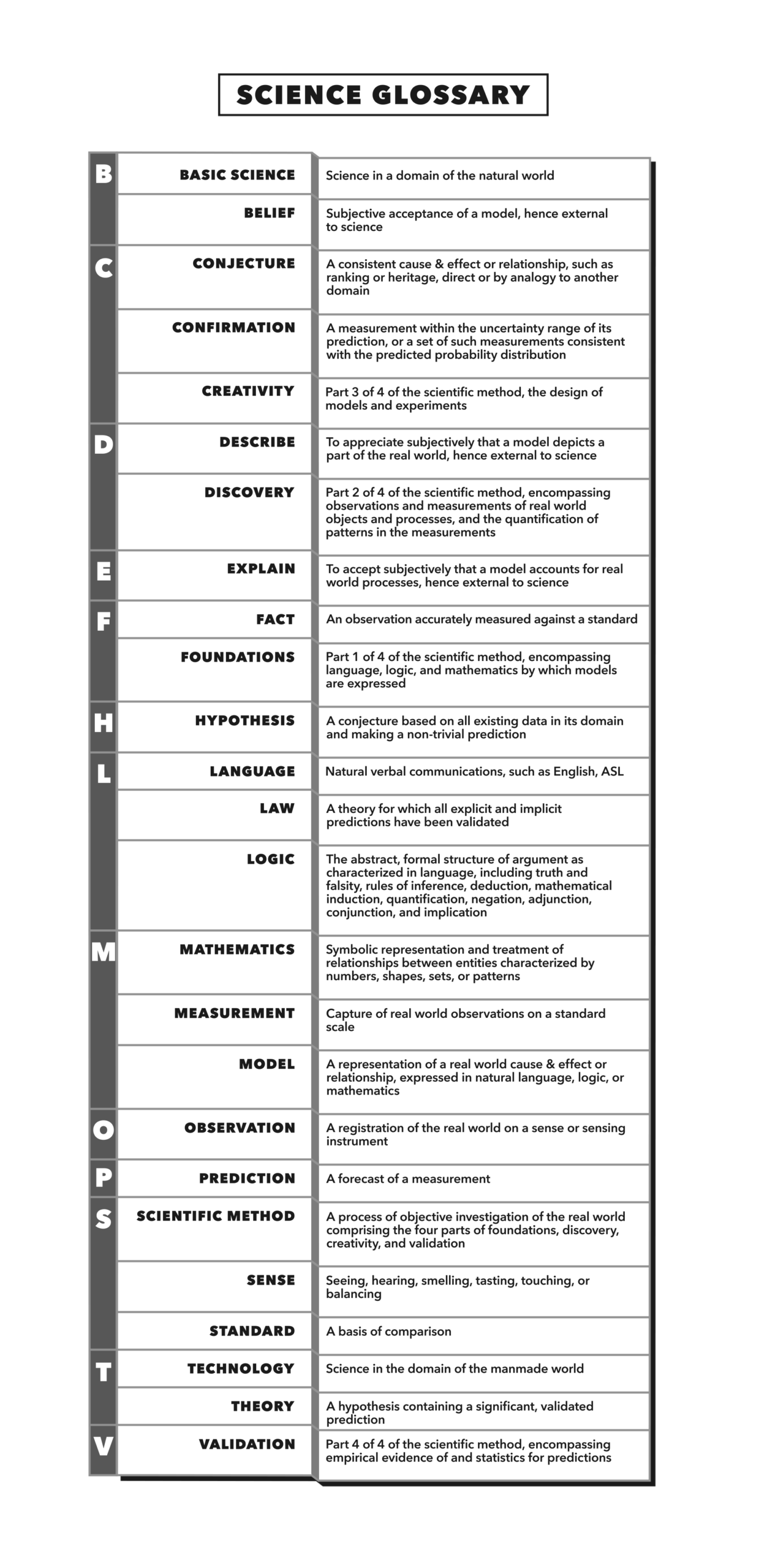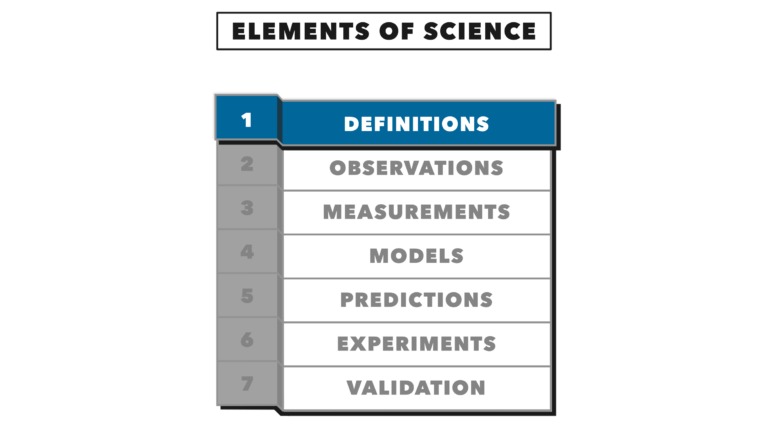Definitions
As previously stated, the first logical step in the scientific method is the setting of precise terms for the discourse. Definitions permit the expression of observations, relationships, and processes with the least ambiguity. Precision in definitions allows observations and measurements to proceed with repeatability.
We can consider our foundational definitions as axioms and terms.
Axioms
We establish a set of axioms for our understanding of science as an essential element of definition. These axioms, or basic assumptions, define the boundaries of our discourse, tying us to a common understanding within which to communicate. We take each of these statements to be true as premises or starting points for any discussion or inquiry into the nature of science.
- Axiom of Rationality: The domain of discourse lies in rational thought. Science and science teaching have no place for the irrational. This is not so much a description of the territory of science but of the collective individuals involved in science. It transcends science; it is an assumed property of knowledge. A less trivial aspect of this axiom is that all who participate in this discourse agree to define their terms, and when challenged, to define them even better.
- Real World Axiom: There exists an all-encompassing real world beyond knowledge. Man perceives, tries to understand and to predict. Each of us, science-trained or not, goes through a process of sensing, perceiving, abstracting, generalizing, and idealizing. The senses inherited by our species limit each individual’s ultimate ability to sense, and then his experiences distort the perceptions he forms from his sensory data. Man is thus isolated from the real world — insulated by the limitations of his senses, by his language, and by his mental models of reality. Science creates the solutions for this problem.
- Cause and Effect Axiom: Each effect observed in the real world has a discoverable cause in the real world. The task of science is to use its predictive power to point to possible cause-and-effect relationships. Science relies on its models to predict novel facts, assuming the cause-and-effect principle as an axiom. Science looks for a new effect produced from a novel cause-and-effect relationship or a new cause for a known effect.
- Axiom of Measurements or Measurability: Every objective observation is comparable to an unambiguous standard. Comparing with a standard is by definition measuring. Consequently, all objective observations are measurable. If a field of discourse exists containing well-defined objects, then the definitions must make these objects mutually differentiable. Discrete decisions about whether or not a specimen possesses some attribute or not will lead to an objective decision about the name of the object. Measurements in such a case involve language but may not yield to quantifying or ordering.
- Axiom of Uncertainty: Every measurement has an error. Every measurement has an ultimate inaccuracy that must be assessed. If the inaccuracy is not in the quantifying, then it is in the definition of the thing measured. Science must hold as well that uncertainty always exists in its models, never satisfied with the current level or degree of understanding.
- Master Clock Axiom: There exists a master clock that is universal, uniform, and unidirectional. This axiom prevents scientists from spending unnecessary time on philosophical tangents. For the convenience of practicing scientists, it denies the twin paradox of relativity. Note that if the master clock is non-uniform, the effect would not be determinable.
- Axiom of Least Work: Systems that can adapt will evolve to the least expenditure of energy. This concept stems from evolution and adaptation, with strong parallels in physics and economics, and is perhaps a corollary of a thermodynamic law and the law of increasing entropy. Life and many natural processes slough excess baggage, seeking ever more efficient forms to survive.
Glossary of Terms
Within the framework of definitions, we can also put forth a glossary of terms. We will return to this glossary throughout our exploration of modern science.

Precision and Objectivity
Objectivity enables people to share ideas and observations unambiguously. This begins with precision in language and its derivatives. Precision refers to the disciplines of using language with maximum clarity and extracting logic from it. It leads to abstractions and eventual mathematical representation, if possible. In one sense, these are precursors to science, and in another sense, they define the terms of discourse as the first step in science.
Perception is a subjective process, shaped by experience and mood, and highly unreliable. A goal of science is to escape the subjective, replacing observations with measurements, and extending the domain of measurements beyond what is observable to the senses.
Fortunately, we can use our brains in concert with others, expanding our perception, increasing both its accuracy and its utility. As much as the individual cells of a brain are more powerful when they work as a whole, the collection of our brains is more powerful than any individual brain, as we travel from subjective perception to objective knowledge through repeated practice and application of the scientific method.
Our brains are geared to work in conjunction with one another. We inherited the capacity for language. We either inherited logic with language or we invented it. And we have invented mathematics. These things allow us to communicate unambiguously, or, as engineers say, coherently. If our brains, like antenna elements, are going to work together in synchronism and with efficiency, our first order of business must include precision in the use of language.
